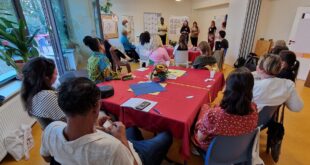On 14 February 2020, the Council of Europe´s Education Department launched a toolkit aimed at integrating refugees as teaching staff or visiting experts into higher education institutions.
The “CoLAB Toolkit” presents inclusive practices on how to best integrate refugees based on their competences and qualifications into the academic environment. The toolkit is based on the lessons learned from the project CoLAB implemented in five higher education institutions in 2018-2019. 28 refugees from 14 different countries participated in a year long project which aimed at taking advantage of the substantial professional experience and qualifications refugees bring with them to the host countries.
Unfortunately, their prior achievements may not be recognised by the new host communities, and it is common for refugees to experience higher than average levels of unemployment, or to be employed below their level of skill.
The coLAB project, implemented within the framework of the European Union/Council of Europe joint programme “Democratic and Inclusive School Culture in Operation” (DISCO), proposes a remedy to this by providing opportunities for refugees to be hired as teaching staff or visiting experts in the participating higher education institutions. Refugees shared their knowledge with students and teaching staff, within the frame of the academic curriculum.
The toolkit provides guidance to other academic institutions, who would like to run similar experience on topics such as coordination, recruitment and preparation of lessons, communication and teaching activities. Recommendations regarding each topic are also put forward.
The toolkit is available in English, French and Spanish.
© Council of Europe 2020
 THE AFRICAN COURIER. Reporting Africa and its Diaspora! The African Courier is an international magazine published in Germany to report on Africa and the Diaspora African experience. The first issue of the bimonthly magazine appeared on the newsstands on 15 February 1998. The African Courier is a communication forum for European-African political, economic and cultural exchanges, and a voice for Africa in Europe.
THE AFRICAN COURIER. Reporting Africa and its Diaspora! The African Courier is an international magazine published in Germany to report on Africa and the Diaspora African experience. The first issue of the bimonthly magazine appeared on the newsstands on 15 February 1998. The African Courier is a communication forum for European-African political, economic and cultural exchanges, and a voice for Africa in Europe.



























